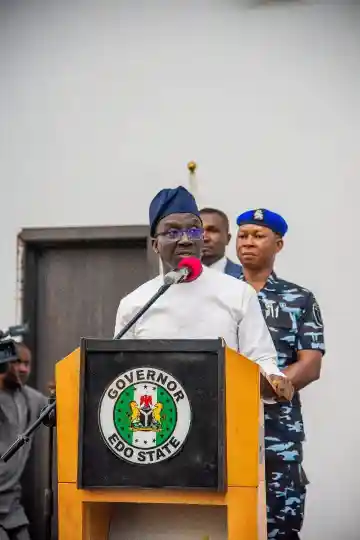June 13, 2025 – Governor Monday Okpebholo of Edo State officially launched a N1 billion interest-free loan scheme on Friday in Benin City. The initiative, aimed at small business owners, farmers, and market traders, is in line with President Bola Ahmed Tinubu’s Renewed Hope Agenda for national development and poverty reduction.
The Governor, addressing an enthusiastic crowd of over 5,000 market traders, stated that the move is a direct step toward empowering the people at the grassroots level. “There is an adage: follow who know road. That is why we decided to follow the footsteps of our President, Bola Ahmed Tinubu,” Okpebholo said. “Today, what we are doing in Edo State is the implementation of the agenda of the President. We thank God for the kind of leadership He has given to Edo State and Nigeria. Now, it is time for the progress for our people.”
Governor Okpebholo stressed that the interest-free microloan scheme is not just a political gesture but a real economic tool designed to create long-term impact. He reminded the audience of his earlier campaign promise to make soft loans available to market women and small-scale traders.
“I just wanted to be sure that this money will not go to the wrong hands. That is the essence of this gathering. Because, with my past experience, whenever the Executive gives out loans, the money does not get to the grassroots,” he explained.
The Governor made it clear that transparency is central to the scheme. He encouraged the traders to speak out if they are left out of the programme. “If you do not get this, come back to me and report,” he declared.
Each qualified beneficiary will receive N200,000 in interest-free loans. The loan repayment is spread over 12 months with a one-month grace period, giving small businesses the breathing space they need to reinvest and grow. The loans will enable traders to invest in inventory, upgrade their businesses, and improve their household incomes.
The loan disbursement marks a significant shift from traditional loan structures, which often trap low-income borrowers in debt due to high-interest rates. With zero interest, the programme removes one of the biggest barriers to financial inclusion for women and smallholder traders.
“This initial phase is a pilot test,” Governor Okpebholo noted. “Its success will determine how we replicate this model across the state. We are starting small but thinking big.”
Also speaking at the event, the Edo State Commissioner for Finance, Emmanuel Ehidiamen Okoebor, described the initiative as a game-changer for rural and semi-urban areas. He said, “It is with great pride and sense of responsibility that I stand before you today to welcome everybody to this occasion of the launching of the N1 billion interest-free loan to Edo people—our traders, our market women, our brothers and our fathers in the state.”
He pointed out that the scheme would strengthen rural economies, promote small-scale enterprise development, and significantly reduce youth unemployment. “Before now, our mothers collected loans and paid 10% on N200,000. For this, there is no interest. You pay back what you borrowed,” he stated.
Okoebor also praised the Governor’s development strides within a short time in office. “He has built flying over, hospitals, schools, employed teachers, increased subvention for our universities to be better than what it was before. Now, he has come to empowering the people,” he added.
The launch event was attended by notable figures including Deputy Governor Hon. Dennis Idahosa, Speaker of the Edo State House of Assembly Sheriff Agbebaku, Secretary to the State Government Barr. Umar Musa Ikhilor, and Chief of Staff Hon. Ganiyu Audu.
Representatives from various market cooperatives, ethnic trader associations, and community development unions were present. These included the Igbo Traders Association, Hausa Traders Association, and several women’s groups from Edo North, Edo Central, and Edo South.
Read Also: NIPOST Recruitment Not Ongoing in Any Department, Mgt. Confirms
The scheme is expected to increase access to business funding in Nigeria, reduce economic hardship, and offer long-term social security to thousands of families.

